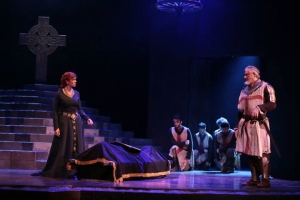
Siobhan Redmond and Darrell D’Silva
Photo courtesy of the National Theatre of Scotland
and Royal Shakespeare Company
Imagine the war-torn Scotland that Malcolm and his English allies found themselves in, once the tyrant Macbeth was defeated.
If that isn’t intriguing enough, imagine that rumors of Lady Macbeth’s demise were mistaken. Imagine if her madness, too, was a rumor, probably put about to discredit her, and that Macbeth’s power had come to him because of his marriage to her—that she was the true heir to Scotland’s sovereignty. Then imagine that an Englishman who means well is in charge of restoring peace to a country where all this is true—a country he cannot begin to understand. You’ll have the setup for Dunsinane by David Greig. Artists from the National Theatre of Scotland and Royal Shakespeare Company are visiting Chicago Shakespeare at Navy Pier from February 26-March 22, 2015 to share this riveting production.
Have I mentioned that Sis gets me a subscription to Chicago Shakespeare every year? It’s a combination birthday and Christmas present. Sometimes we choose the three-play series, sometimes the four-play, and sometimes—though not often—we go for all five. This was one of those years, but oddly, we were iffy about Dunsinane. During our post-performance discussion, we remembered how we almost didn’t go. I channeled Julia Roberts (in Pretty Woman) to assert, “That would have been a big mistake. Huge.”
Dunsinane was about peace and war and politics, including sexual politics. There were a surprising number of laughs in it. In part, it was a cautionary tale about a nation that sees itself as a stronger, more culturally advanced power than its neighbors deciding to go in and meddle in the “lesser” culture’s government to keep themselves safe and bring enlightenment and better government. The nations in this story were England and Scotland, but they could just as well have been the United States and “pick-any-nation-we-believe-is-unstable-and-poses-a-threat-to-our-security.”
There was so much food for thought in this play, so many questions raised. Is peace a natural state, or even possible? What makes a person bad or good? In the end, will one of them do more (or less) harm than the other?
The writing was so excellent I haven’t even touched on the production, so here is what I haven’t said: while some roles were more demanding than others (Siobhan Redmond as Gruach, Darrell D’Silva as Siward) the ensemble’s acting was stellar, the direction and design (Roxana Silbert, Robert Innes Hopkins, Chahine Yavroyan) were so good as to seem inevitable, and the live music by Nick Powell grabbed me by the heart from the first drumbeats.
I feel lucky just to have seen it. You can still get tickets for some performances, though many are sold out as of this posting. Until March 22, 2015, check with Chicago Shakespeare.
